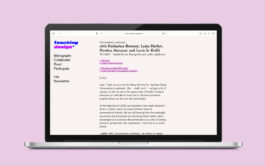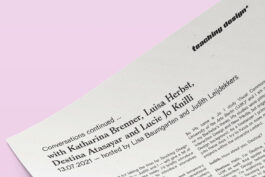

Creating Safer Spaces: Student-Led Transformation in Design Education – A conversation with Katharina Brenner, Luisa Herbst, Destina Atasayar and Lucie Jo Knilli
With the series “Teaching Design Conversations continued...”, hosts Lisa Baumgartner and Judith Lejdekkers reflect on design education through dialogue — facilitating critical reflection and the production of counter-knowledge. The series brings together educators, students, alumni, and staff from both institutional and self-organized contexts to share practices and perspectives, working collectively toward transforming design education. Rooted in feminist and decolonial discourses, dialogue is understood as a practice of listening, giving space, and taking one another seriously — embracing difference as a productive ground for learning. Each conversation is recorded and later edited in close collaboration with the participants, honoring the political and personal nature of what is shared.
As part of the collective Eine Krise bekommen, I took part in one of the episodes, where we — as visual communication students from UdK Berlin — discussed our self-organized seminar “Eine Krise bekommen: Design und Psychische Gesundheit” (2021). In this conversation, we explored problematic structures within design education, including mental health challenges, toxic work environments, and experiences of discrimination. We spoke about how collective organizing enabled us to question institutional norms such as overwork, productivity pressure, and competitiveness, while developing practical approaches for creating safer and more caring learning spaces through tools like action cards, questionnaires, and flexible structures. The dialogue highlights how practices of care, collective exchange, and the questioning of hierarchies can open new possibilities for reimagining design education.
Authors: Judith Leijdekkers & Lisa Baumgarten in conversation with Eine Krise bekommen (Destina Atasayar, Katharina Brenner, Lu Herbst & Lucie Jo Knilli)
Read here: Teaching Design (PDF or online)
Year: 2021
Creating Safer Spaces: Student-Led Transformation in Design Education – A conversation with Katharina Brenner, Luisa Herbst, Destina Atasayar and Lucie Jo Knilli
With the series “Teaching Design Conversations continued...”, hosts Lisa Baumgartner and Judith Lejdekkers reflect on design education through dialogue — facilitating critical reflection and the production of counter-knowledge. The series brings together educators, students, alumni, and staff from both institutional and self-organized contexts to share practices and perspectives, working collectively toward transforming design education. Rooted in feminist and decolonial discourses, dialogue is understood as a practice of listening, giving space, and taking one another seriously — embracing difference as a productive ground for learning. Each conversation is recorded and later edited in close collaboration with the participants, honoring the political and personal nature of what is shared.
As part of the collective Eine Krise bekommen, I took part in one of the episodes, where we — as visual communication students from UdK Berlin — discussed our self-organized seminar “Eine Krise bekommen: Design und Psychische Gesundheit” (2021). In this conversation, we explored problematic structures within design education, including mental health challenges, toxic work environments, and experiences of discrimination. We spoke about how collective organizing enabled us to question institutional norms such as overwork, productivity pressure, and competitiveness, while developing practical approaches for creating safer and more caring learning spaces through tools like action cards, questionnaires, and flexible structures. The dialogue highlights how practices of care, collective exchange, and the questioning of hierarchies can open new possibilities for reimagining design education.

